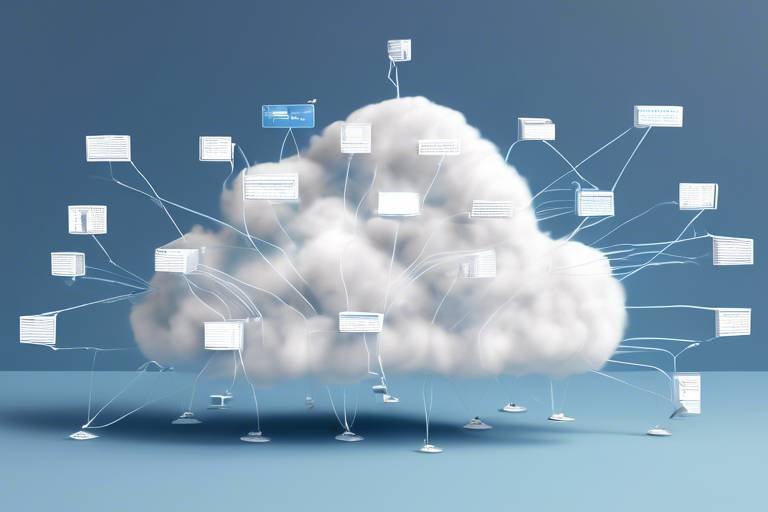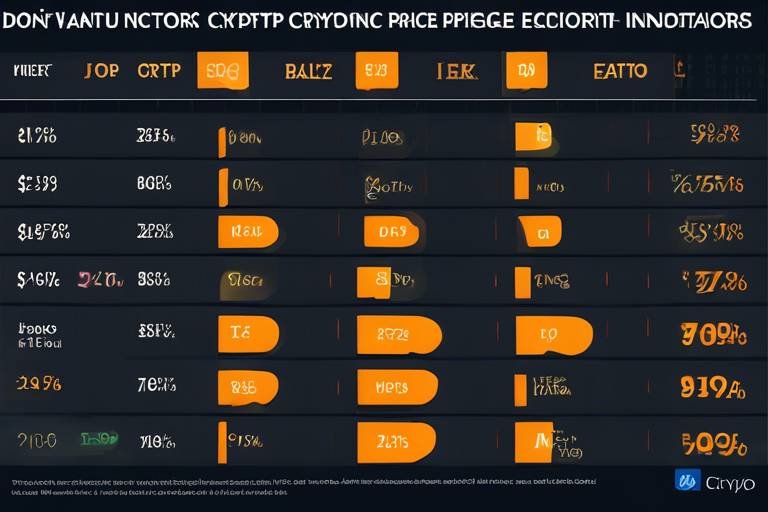The Future of Decentralized Cloud Computing
As we stand on the brink of a technological revolution, the concept of decentralized cloud computing is emerging as a game-changer. Imagine a world where your data is not stored in a single, vulnerable location but is instead scattered across a network of interconnected nodes. This innovative approach not only enhances security but also democratizes access to computing resources. In this article, we'll dive deep into the evolution and potential of decentralized cloud computing, exploring its myriad benefits, the challenges it faces, and its implications for both technology and society.
Decentralized cloud computing refers to the distribution of computing resources across multiple locations, enhancing security and efficiency. Unlike traditional cloud models, which rely on centralized data centers, decentralized systems utilize a network of nodes that collaborate to provide computing power and storage. This means that instead of having your data stored in one place, it is fragmented and stored across various locations, making it significantly harder for hackers to access. Think of it as a jigsaw puzzle where each piece is spread out, and without all the pieces, it’s much more difficult for someone to see the complete picture.
The benefits of decentralized cloud computing are numerous and impactful. First and foremost, it offers increased security. With data distributed across multiple nodes, the risk of a single point of failure is drastically reduced. Additionally, decentralized systems often incorporate advanced encryption techniques, further protecting sensitive information. Another significant advantage is reduced downtime. Traditional cloud services can experience outages, affecting countless users. However, decentralized networks can continue operating even if one or more nodes go down, ensuring that services remain available. Moreover, these solutions can lead to lower costs for businesses, as they can avoid the hefty fees associated with traditional cloud services.
Security is a primary concern in cloud computing, and decentralized systems rise to the occasion. By distributing data across a network, the chances of a successful cyberattack diminish. Each piece of data is encrypted and stored in different locations, making it incredibly challenging for unauthorized users to access sensitive information. Furthermore, decentralized systems often use advanced consensus algorithms, which require multiple nodes to agree on any changes made to the data, adding an extra layer of security. In essence, it's like having a vault that requires multiple keys from different locations to unlock, making it nearly impossible for a single intruder to gain access.
With growing concerns over data privacy, decentralized cloud computing offers solutions that empower users to control their data. Unlike traditional cloud services, where users often relinquish control over their information, decentralized systems allow individuals to manage their data more effectively. Technologies such as zero-knowledge proofs and homomorphic encryption are becoming increasingly prevalent, enabling users to prove ownership of their data without revealing the data itself. This shift not only enhances privacy but also builds trust between users and service providers.
Decentralized systems are inherently more resilient against cyberattacks. By distributing data across multiple nodes, the risks associated with centralized infrastructures are significantly mitigated. If one node is compromised, the rest of the network remains intact, ensuring that the overall system continues to function. This resilience is akin to a flock of birds; if one bird is taken out, the rest can still fly together, maintaining their course. This characteristic makes decentralized cloud computing a robust solution in an era where cyber threats are becoming increasingly sophisticated.
Despite its advantages, decentralized cloud computing faces significant challenges. One of the most pressing issues is scalability. As more users join the network, ensuring that it can handle increased loads without sacrificing performance is crucial. Additionally, interoperability between different decentralized systems can be a hurdle, as they may use varying protocols and technologies. Lastly, regulatory issues pose a challenge, as governments are still grappling with how to regulate decentralized technologies, which can vary widely in their implementations and uses.
As technology evolves, so does the landscape of decentralized cloud computing. Emerging trends and innovations are set to shape the future of this field. One of the most significant developments is the integration with blockchain technology. Blockchain enhances security, transparency, and trust in cloud computing environments, making it a perfect match for decentralized systems. Furthermore, the potential impact on businesses is profound; companies can leverage decentralized cloud solutions to improve efficiency, reduce costs, and create more resilient infrastructures.
Blockchain technology plays a crucial role in decentralized cloud solutions. By utilizing a distributed ledger, blockchain ensures that all transactions are recorded transparently and securely. This not only enhances trust among users but also eliminates the need for intermediaries, which can slow down processes and increase costs. As businesses increasingly adopt blockchain, we can expect a surge in the development of decentralized applications that leverage cloud computing capabilities.
The adoption of decentralized cloud computing could revolutionize business operations. Companies can streamline their processes, reduce reliance on centralized providers, and enhance their overall security posture. By embracing decentralized solutions, businesses can not only cut costs but also improve their agility in responding to market changes. This shift is akin to moving from a traditional car to an electric vehicle; it’s not just about saving money on gas, but also about embracing a more sustainable and efficient future.
- What is decentralized cloud computing? Decentralized cloud computing refers to the distribution of computing resources across multiple locations, enhancing security and efficiency.
- How does decentralized cloud computing enhance security? By distributing data across multiple nodes, the risk of a single point of failure is drastically reduced, and advanced encryption techniques are often employed.
- What are the challenges of decentralized cloud computing? Key challenges include scalability, interoperability, and regulatory issues.
- How does blockchain technology contribute to decentralized cloud computing? Blockchain enhances security, transparency, and trust by providing a secure, distributed ledger for transactions.
- What impact will decentralized cloud computing have on businesses? It could revolutionize operations by improving efficiency, reducing costs, and enhancing security.

Understanding Decentralized Cloud Computing
Decentralized cloud computing is a fascinating evolution in the realm of technology, representing a significant shift from traditional cloud models. In simple terms, it refers to the distribution of computing resources across multiple locations rather than relying on a single, centralized server. Imagine a vast network of interconnected nodes, each capable of storing and processing data independently. This approach not only enhances efficiency but also bolsters security, making it a compelling alternative for businesses and individuals alike.
The foundational principles of decentralized cloud computing revolve around the idea of distributed architecture. Unlike conventional cloud services, which often store data in large data centers owned by a single entity, decentralized systems utilize a network of nodes that can be managed by different organizations or even individuals. This means that data is not only stored in multiple places but is also processed closer to where it is generated, reducing latency and improving performance. Furthermore, this model fosters a sense of community, as users can contribute their resources to the network, creating a more resilient and robust system.
One of the key differences between decentralized cloud computing and traditional cloud models lies in the way data is handled. In a centralized model, all data flows through a single point, making it a prime target for cyberattacks. On the other hand, decentralized systems distribute data across various nodes, significantly reducing the risk of a single point of failure. This means that even if one node is compromised, the entire system remains operational, much like how a flock of birds can still fly even if one bird is injured. Additionally, decentralized cloud solutions often employ advanced encryption techniques, ensuring that data remains secure and private throughout its journey across the network.
As we delve deeper into the world of decentralized cloud computing, it’s essential to recognize its potential to transform industries. By leveraging the power of distributed resources, businesses can achieve greater scalability and flexibility. For instance, during peak demand periods, resources can be dynamically allocated from various nodes to meet the increased load without the need for costly infrastructure upgrades. This not only saves money but also enhances user experience by providing faster and more reliable access to services.
In summary, understanding decentralized cloud computing requires a shift in perspective from traditional models. It’s about embracing a new paradigm that prioritizes security, efficiency, and community collaboration. As we continue to explore this exciting field, we’ll uncover the myriad benefits it offers and the challenges that lie ahead. The future of cloud computing is decentralization, and it’s poised to reshape how we think about data storage and processing.

Benefits of Decentralized Cloud Solutions
Decentralized cloud computing is not just a buzzword; it's a revolutionary shift in how we manage and utilize computing resources. Imagine a world where your data isn't locked away in a single, vulnerable server but is instead spread across a network of nodes, each working together to keep your information safe and accessible. This shift brings with it a multitude of benefits that can significantly impact both businesses and consumers.
One of the most compelling advantages is increased security. In a decentralized model, data is fragmented and distributed across various locations. This means that even if one node is compromised, the overall integrity of the data remains intact. Think of it like a puzzle: if a few pieces are missing or damaged, you can still see the complete picture. This distribution of data not only enhances security but also provides a robust defense against potential cyberattacks.
Another significant benefit is the potential for reduced downtime. Traditional cloud systems often rely on centralized servers, which can become bottlenecks during high traffic periods or outages. In contrast, decentralized systems distribute workloads across multiple nodes. This means that if one node goes down, others can take over its responsibilities, ensuring that services remain uninterrupted. Businesses can operate more smoothly, avoiding the costly interruptions that can arise from server failures.
Cost efficiency is also a major player in the advantages of decentralized cloud solutions. By utilizing a network of existing resources rather than investing heavily in centralized infrastructure, companies can significantly lower their operational costs. This model allows businesses to pay for what they use, similar to how you might only pay for the electricity you consume rather than a flat rate for a whole building. As a result, smaller companies can compete more effectively with larger enterprises, fostering innovation and diversity in the marketplace.
Moreover, decentralized cloud solutions promote data sovereignty. In an age where data privacy is paramount, users can have more control over where their data is stored and how it is managed. This control is crucial for complying with various regulations, such as the General Data Protection Regulation (GDPR) in Europe. With decentralized systems, users can choose to keep their data within specific jurisdictions, ensuring that they adhere to local laws and regulations.
To summarize, the benefits of decentralized cloud solutions are extensive and transformative. Here’s a quick recap of the key points:
- Enhanced Security: Data is distributed, reducing vulnerability.
- Reduced Downtime: Workloads are balanced across nodes, ensuring continuous service.
- Cost Efficiency: Pay-as-you-go models lower operational costs.
- Data Sovereignty: Users have control over data location and compliance.
As we continue to explore the potential of decentralized cloud computing, it becomes clear that these benefits not only improve operational efficiency but also empower users in a way that traditional models cannot. The future is bright for decentralized solutions, and as more businesses recognize these advantages, we can expect to see a significant shift in how cloud computing is approached.
Q1: What is decentralized cloud computing?
A1: Decentralized cloud computing distributes computing resources across multiple locations instead of relying on a single centralized server, enhancing security and efficiency.
Q2: How does decentralized cloud computing improve security?
A2: By distributing data across various nodes, decentralized systems reduce the risk of data breaches and ensure that even if one node is compromised, the overall data remains secure.
Q3: What are the cost implications of using decentralized cloud solutions?
A3: Decentralized cloud solutions often operate on a pay-as-you-go model, allowing businesses to lower operational costs compared to traditional centralized cloud services.
Q4: Can decentralized cloud computing help with data privacy?
A4: Yes, decentralized systems empower users to control where their data is stored, helping them comply with regulations like GDPR and ensuring greater data privacy.

Enhanced Security Features
When it comes to cloud computing, security is often at the forefront of concerns for both individuals and businesses. Traditional cloud systems, while effective, often centralize data in a way that can make it vulnerable to breaches and attacks. In contrast, decentralized cloud computing offers a fresh perspective on security by distributing data across multiple nodes. This distribution not only enhances security but also creates a more resilient environment for data storage and processing.
One of the standout features of decentralized cloud solutions is their ability to utilize encryption techniques effectively. By encrypting data before it is distributed across the network, users can ensure that even if a data node is compromised, the information remains secure and unreadable to unauthorized parties. This layered approach to security is akin to having multiple locks on your front door; even if one is picked, others remain intact, safeguarding your valuables.
Moreover, decentralized systems can leverage peer-to-peer technology, which allows users to connect directly with one another without the need for a central server. This not only reduces the risk of a single point of failure but also enhances privacy. When data is stored across various locations, it becomes significantly harder for malicious actors to access all the information at once. In a world where cyberattacks are becoming increasingly sophisticated, this method of data distribution can serve as a powerful deterrent.
Another critical aspect of enhanced security in decentralized cloud computing is the concept of data redundancy. By replicating data across multiple nodes, the system ensures that even if one node fails or is attacked, the data remains accessible from other locations. This redundancy not only improves data availability but also enhances the overall resilience of the system against attacks. Imagine a spider web, where if one strand is cut, the web still holds together, maintaining its structure and function.
In addition to these features, decentralized cloud computing also provides users with greater control over their data. Unlike traditional models where data is often stored on servers owned by a third party, decentralized solutions empower users to manage their own information. This autonomy is crucial in today's digital landscape, where data privacy is a growing concern. Users can choose where their data is stored and who has access to it, thus minimizing the risks associated with data breaches.
To summarize, the enhanced security features of decentralized cloud computing offer a robust alternative to traditional cloud models. By utilizing encryption, peer-to-peer technology, data redundancy, and user control, decentralized systems create a secure environment that is better equipped to handle the challenges of modern cyber threats. As we continue to navigate the digital age, these innovations may very well define the future of cloud security.

Data Privacy Considerations
In an age where data breaches and privacy concerns dominate headlines, decentralized cloud computing offers a refreshing alternative that prioritizes user control and data security. Unlike traditional cloud systems, where data is often stored in centralized servers vulnerable to attacks, decentralized models distribute data across multiple nodes. This distribution means that even if one node is compromised, the entire system remains secure. It's akin to having your valuables spread across different safes in various locations rather than keeping everything in one easily accessible drawer.
The essence of data privacy in decentralized cloud computing lies in empowering users. With technologies such as encryption and zero-knowledge proofs, users can maintain control over who accesses their information. For instance, encryption transforms data into a format that can only be read by someone with the right key, making it nearly impossible for unauthorized users to decipher. This adds a layer of security that is crucial in today’s digital landscape.
Moreover, decentralized systems often incorporate privacy-enhancing technologies that allow users to share data without revealing their identities. This is particularly beneficial for businesses that handle sensitive customer information. By leveraging these technologies, companies can conduct transactions and share data while ensuring that personal information remains confidential. Imagine being able to share your health records with a doctor without worrying that your entire medical history will be exposed to the world.
However, while decentralized cloud computing presents promising solutions for data privacy, it is not without its challenges. The complexity of managing decentralized networks can lead to inconsistencies in data privacy practices. Users must be educated about how to use these technologies effectively to ensure their data remains secure. Additionally, regulatory frameworks are still catching up with these innovations, creating a landscape where compliance can be tricky.
In conclusion, the shift towards decentralized cloud computing represents a significant leap forward in the quest for data privacy. By distributing data across various nodes and employing advanced encryption techniques, users gain unprecedented control over their information. Yet, as with any emerging technology, it’s essential to remain vigilant and educated about the potential risks and challenges that accompany this new frontier in cloud computing.
- What is decentralized cloud computing? Decentralized cloud computing distributes computing resources across multiple locations, enhancing security and efficiency compared to traditional centralized models.
- How does it improve data privacy? It allows users to control their data through encryption and privacy-enhancing technologies, reducing the risk of unauthorized access.
- Are there any challenges with decentralized cloud computing? Yes, challenges include scalability, interoperability, and the need for regulatory compliance.
- What role does blockchain play in decentralized cloud computing? Blockchain enhances security and transparency, providing a reliable framework for decentralized systems.

Resilience Against Attacks
In today's digital landscape, where cyber threats loom large, the resilience of decentralized cloud computing stands out as a beacon of hope. Unlike traditional cloud systems that centralize data in a single location, decentralized models distribute data across multiple nodes. This distribution is akin to scattering seeds across a vast field rather than planting them all in one spot. If a storm hits one area, the rest remain safe and sound, ensuring a higher chance of survival.
One of the primary benefits of this architecture is its ability to mitigate risks associated with cyberattacks. In a centralized system, a single breach can lead to catastrophic data loss and service interruptions. However, in a decentralized setup, even if one node is compromised, the rest of the network continues to function. This inherent redundancy not only protects against data loss but also enhances service availability, making it more challenging for attackers to bring down the entire system.
Moreover, decentralized cloud computing employs advanced encryption techniques and protocols that ensure data remains secure during transmission and storage. By encrypting data at the source and distributing it across various nodes, the system minimizes the risk of interception. Even if an attacker gains access to a single node, they would only encounter a fraction of the data, making it significantly harder to piece together valuable information.
To illustrate the effectiveness of decentralized systems against attacks, consider the following comparison:
| Feature | Centralized Cloud | Decentralized Cloud |
|---|---|---|
| Data Storage | Single location | Distributed across multiple nodes |
| Impact of Breach | Entire system compromised | Localized breach, rest unaffected |
| Data Recovery | Challenging and time-consuming | Quicker recovery due to redundancy |
| Encryption | Standard encryption | Advanced, multi-layered encryption |
In summary, the resilience of decentralized cloud computing against attacks is not just a theoretical concept; it is a practical solution to the growing threat of cybercrime. By distributing data and employing robust encryption methods, decentralized systems create a formidable defense against potential intrusions. As businesses look to safeguard their operations and data, embracing decentralized cloud solutions could be a game-changer in the ongoing battle against cyber threats.
- What is decentralized cloud computing?
Decentralized cloud computing refers to the distribution of computing resources across multiple locations rather than relying on a single, centralized server. This model enhances security, efficiency, and resilience. - How does decentralization improve security?
By distributing data across multiple nodes, decentralized systems reduce the risk of a single point of failure. Even if one node is compromised, the rest remain secure, making it harder for attackers to access valuable information. - Can decentralized cloud computing help businesses?
Yes, businesses can leverage decentralized cloud solutions to improve operational efficiency, reduce costs, and enhance data security, ultimately leading to better service delivery and customer satisfaction. - What role does encryption play in decentralized systems?
Encryption is crucial in decentralized cloud computing as it protects data during transmission and storage, ensuring that even if data is intercepted, it remains unreadable without the proper decryption keys.

Challenges Facing Decentralized Cloud Computing
While the promise of decentralized cloud computing is enticing, it’s not without its hurdles. One of the most significant challenges is scalability. Unlike traditional cloud systems, which can easily expand by adding more servers in a centralized location, decentralized systems require coordination among numerous nodes. This can complicate the process of scaling up resources to meet demand. Imagine trying to organize a massive concert with multiple stages spread across a city; the logistical challenges can be daunting!
Another major obstacle is interoperability. Different decentralized platforms often use varied protocols and standards, making it difficult for them to communicate with one another. This lack of compatibility can lead to inefficiencies and a fragmented user experience. It's like trying to connect different brands of smart home devices that don't speak the same language—frustrating and counterproductive.
Regulatory issues also loom large in the landscape of decentralized cloud computing. As governments worldwide grapple with how to regulate data privacy and security, decentralized models present unique challenges. For instance, if data is spread across multiple jurisdictions, determining which laws apply can become a legal quagmire. This uncertainty can deter businesses from fully embracing decentralized solutions due to fears of non-compliance.
Moreover, the user experience in decentralized systems can sometimes be less intuitive than in traditional models. Users accustomed to the simplicity of centralized services may find the learning curve steep when navigating decentralized platforms. This can hinder widespread adoption, as users may prefer the comfort of familiar systems over the complexities of decentralized alternatives.
Lastly, there's the issue of performance. While decentralized systems can be incredibly resilient, they can also suffer from latency issues due to the need for data to travel across multiple nodes. This can lead to slower response times, which is a critical factor for applications requiring real-time processing. Just think about it—if you had to wait longer for your favorite streaming service to buffer because of a decentralized setup, would you stick around?
In summary, while decentralized cloud computing holds immense potential, it must overcome significant challenges related to scalability, interoperability, regulation, user experience, and performance. Addressing these issues will be crucial for the technology to realize its full promise in the future.
- What is decentralized cloud computing? Decentralized cloud computing distributes computing resources across multiple locations, enhancing security and efficiency compared to traditional models.
- What are the main benefits of decentralized cloud solutions? Key benefits include increased security, reduced downtime, and lower costs, making it an attractive option for businesses and consumers alike.
- What challenges does decentralized cloud computing face? Major challenges include scalability, interoperability, regulatory issues, user experience, and performance concerns.
- How does blockchain technology relate to decentralized cloud computing? Blockchain enhances security, transparency, and trust in decentralized cloud environments, making it a pivotal component of the technology.
- What impact could decentralized cloud computing have on businesses? It could revolutionize operations by improving efficiency, reducing costs, and providing better data control and security.

Future Trends in Decentralized Cloud Computing
The world of decentralized cloud computing is rapidly evolving, and as we look to the future, several key trends are emerging that promise to reshape the landscape of technology and user interactions. Imagine a world where your data is not just stored in a single location but is instead spread across a network of nodes, each contributing to a more secure and efficient system. This is not just a dream; it’s a reality that is becoming increasingly tangible. One of the most significant trends is the integration of blockchain technology into decentralized cloud solutions. By leveraging the inherent characteristics of blockchain—such as immutability, transparency, and decentralization—companies can create environments that not only protect data but also enhance trust among users. The transparency offered by blockchain can help mitigate fears surrounding data manipulation and unauthorized access, making it a game-changer in the realm of cloud computing.
Moreover, as businesses begin to understand the potential of decentralized cloud solutions, we are likely to see a surge in adoption across various sectors. Companies are always on the lookout for ways to improve efficiency and cut costs, and decentralized cloud computing offers a unique opportunity to achieve these goals. By distributing resources and workloads, businesses can reduce reliance on expensive centralized infrastructures, thereby lowering operational costs. This shift could lead to a more democratized tech landscape, where small businesses can compete on a more level playing field with larger corporations.
Additionally, the demand for data privacy is growing stronger, and decentralized cloud solutions are well-positioned to meet this need. With users becoming more aware of their digital footprints, the ability to control and manage personal data is paramount. Future trends indicate that we will see more privacy-enhancing technologies integrated into decentralized systems, allowing users to maintain ownership of their data while enjoying the benefits of cloud computing. Technologies such as zero-knowledge proofs and advanced encryption techniques are likely to gain traction, further empowering users and building trust in these systems.
However, while these trends are promising, they also come with challenges, particularly regarding scalability and interoperability. As decentralized networks grow, ensuring that they can handle increased loads without sacrificing performance will be crucial. Moreover, the ability for different decentralized systems to communicate and work together seamlessly will be a significant factor in their success. Addressing these challenges will require innovative solutions and collaboration among developers, businesses, and regulators.
In conclusion, the future of decentralized cloud computing is bright, filled with potential that could revolutionize how we think about data storage and management. By embracing blockchain technology, enhancing data privacy, and overcoming scalability challenges, we can create a more secure, efficient, and user-centric cloud computing environment. As we move forward, it will be exciting to see how these trends unfold and how they will impact not only businesses but also individual users in their daily lives.
- What is decentralized cloud computing? Decentralized cloud computing refers to a distributed network of computing resources, enhancing security and efficiency compared to traditional centralized systems.
- How does blockchain enhance decentralized cloud computing? Blockchain provides security, transparency, and trust, making it harder for unauthorized access and data manipulation.
- What are the main benefits of decentralized cloud solutions? Benefits include increased security, reduced downtime, lower costs, and enhanced data privacy.
- What challenges does decentralized cloud computing face? Key challenges include scalability, interoperability, and regulatory issues that need to be addressed for widespread adoption.

Integration with Blockchain Technology
When we think about the future of decentralized cloud computing, one of the most exciting aspects is its . Imagine a world where your data isn't just sitting in a massive, centralized server farm, vulnerable to breaches and hacks. Instead, it's scattered across a network of nodes, each one secured by the robust principles of blockchain. This integration brings a new level of security, transparency, and trust that traditional cloud solutions simply can't match.
So, how does blockchain enhance decentralized cloud computing? First off, let’s consider security. In a blockchain, data is stored in a way that is immutable and tamper-proof. Each transaction or data entry is linked to the previous one, creating a chain that is incredibly hard to alter. This means that even if a malicious actor gains access to one node, they cannot easily manipulate the data without altering every subsequent block—a near-impossible task.
Moreover, the decentralized nature of blockchain means that there is no single point of failure. If one node goes down, the system remains operational, which significantly reduces downtime. This resilience is crucial for businesses that rely on constant access to their data. Think of it like a spider’s web; if one strand breaks, the web still holds together. In this way, decentralized cloud computing powered by blockchain can provide a more reliable infrastructure for data storage and processing.
Additionally, the transparency offered by blockchain technology is a game-changer. With all transactions recorded on a public ledger, users can trace the history of their data and verify its authenticity. This not only fosters trust among users but also encourages accountability among service providers. Imagine being able to see exactly how your data is being used and shared—this kind of visibility is a significant leap forward in data governance.
One of the most innovative applications of blockchain in decentralized cloud computing is the use of smart contracts. These are self-executing contracts with the terms of the agreement directly written into code. This means that transactions can be automated, reducing the need for intermediaries and thereby cutting costs. For instance, if a company needs to pay for cloud storage, a smart contract could automatically execute the payment when certain conditions are met, streamlining operations and enhancing efficiency.
However, as with any emerging technology, there are challenges to consider. The scalability of blockchain solutions is still a concern, especially when it comes to handling large volumes of data. But as technology evolves, we can expect to see advancements that address these issues, making the integration of blockchain and decentralized cloud computing even more effective.
In summary, the integration of blockchain technology into decentralized cloud computing is not just a trend; it's a necessary evolution that promises to revolutionize how we think about data security, transparency, and efficiency. As businesses and consumers become more aware of these benefits, we can anticipate a shift towards these innovative solutions that empower users and enhance trust in the digital landscape.
- What is decentralized cloud computing?
Decentralized cloud computing refers to the distribution of computing resources across multiple locations, which enhances security and efficiency compared to traditional cloud models. - How does blockchain improve security in decentralized cloud computing?
Blockchain enhances security by making data immutable and tamper-proof, ensuring that even if one node is compromised, the overall integrity of the data remains intact. - What are smart contracts?
Smart contracts are self-executing contracts where the terms are written into code, allowing for automated transactions without the need for intermediaries. - What challenges does decentralized cloud computing face?
Challenges include scalability, interoperability, and regulatory issues that must be addressed for widespread adoption.

Potential Impact on Businesses
The adoption of decentralized cloud computing is set to revolutionize the way businesses operate, offering a plethora of opportunities that traditional cloud models simply cannot match. Imagine a world where companies can reduce their reliance on single points of failure, thus enhancing their operational resilience and flexibility. This shift not only paves the way for improved efficiency but also opens the door to innovative business models that can adapt to the ever-changing technological landscape.
One of the most significant impacts of decentralized cloud solutions is the potential for cost reduction. By distributing computing resources across a network of nodes, businesses can minimize their infrastructure expenses. This is particularly beneficial for startups and small enterprises that often operate on tight budgets. Instead of investing heavily in centralized data centers, businesses can leverage decentralized platforms that allow them to pay only for the resources they use. This model resembles the transition from owning physical cars to using ride-sharing services—why own when you can access what you need on demand?
Moreover, decentralized cloud computing enhances collaboration among teams, regardless of their geographical locations. With data stored across various nodes, employees can access the information they need without the bottlenecks typically associated with centralized systems. This capability fosters a more agile work environment, where teams can innovate and respond to market changes swiftly. Picture a global team of developers working on a project simultaneously, sharing and accessing data in real-time without the fear of downtime or data loss. This level of collaboration could very well lead to breakthroughs in product development and service delivery.
However, the transition to decentralized cloud computing is not without its challenges. Businesses must consider factors such as scalability and interoperability. As organizations grow, their needs will evolve, and the decentralized systems they choose must be able to scale accordingly. Furthermore, interoperability between different decentralized platforms is crucial to ensure seamless operations. Companies will need to invest in training and development to equip their teams with the knowledge required to navigate this new landscape effectively.
In addition, the impact on customer relationships cannot be understated. With increased data privacy and security measures inherent in decentralized systems, customers will likely feel more confident in sharing their information with businesses. This trust can lead to stronger customer relationships and loyalty, as consumers are becoming increasingly aware of the importance of data protection. In a world where data breaches are becoming all too common, businesses that prioritize security through decentralized solutions will stand out in the marketplace.
To summarize, the potential impact of decentralized cloud computing on businesses is profound. From cost savings and enhanced collaboration to improved customer trust and data security, the benefits are substantial. However, as with any technological shift, businesses must be prepared to navigate the challenges that come with it. The future is bright for those willing to embrace this change, and the rewards could be game-changing.
- What is decentralized cloud computing?
Decentralized cloud computing refers to the distribution of computing resources across multiple locations, enhancing security and efficiency compared to traditional centralized cloud models.
- How can businesses benefit from decentralized cloud solutions?
Businesses can benefit through cost reductions, improved collaboration, enhanced data security, and increased customer trust.
- What challenges might businesses face when adopting decentralized cloud computing?
Challenges include scalability, interoperability, and the need for training to effectively utilize decentralized systems.
Frequently Asked Questions
- What is decentralized cloud computing?
Decentralized cloud computing is a model where computing resources are distributed across multiple locations rather than being centralized in a single data center. This approach enhances security, efficiency, and resilience, allowing users to access services without relying on a single point of failure.
- What are the main benefits of decentralized cloud solutions?
Decentralized cloud solutions offer several advantages, including increased security through data distribution, reduced downtime due to multiple nodes, and lower costs by eliminating the need for large centralized infrastructures. These benefits make it appealing for both businesses and individual users.
- How does decentralized cloud computing enhance security?
Decentralized systems enhance security by distributing data across various nodes, making it more challenging for attackers to compromise the entire network. Additionally, they often employ advanced encryption techniques to protect sensitive information, ensuring that users have better control over their data.
- What privacy considerations should users be aware of?
Users should be aware that decentralized cloud computing empowers them with greater control over their data. Privacy-enhancing technologies, such as encryption and user-managed access controls, help safeguard personal information, addressing growing concerns over data privacy in the digital age.
- What challenges does decentralized cloud computing face?
Despite its advantages, decentralized cloud computing faces challenges such as scalability, interoperability among different systems, and regulatory compliance. Addressing these issues is crucial for the widespread adoption of decentralized solutions in various industries.
- How is blockchain technology integrated into decentralized cloud computing?
Blockchain technology is pivotal in decentralized cloud solutions as it enhances security, transparency, and trust. By utilizing blockchain, data can be securely stored and verified across multiple nodes, ensuring that users can rely on the integrity of their information.
- What impact will decentralized cloud computing have on businesses?
The adoption of decentralized cloud computing has the potential to revolutionize business operations by improving efficiency, reducing costs, and enhancing security. Companies can leverage these solutions to streamline processes and create more resilient infrastructures that can adapt to changing demands.



















